BSL305 Company Law Assignment: Duty of Directors and Shares Act 2001
VerifiedAdded on 2022/08/20
|11
|2607
|8
Report
AI Summary
This report provides a detailed analysis of the duties of directors and the rights of shareholders under the Corporations Act 2001. It begins by examining the regulations surrounding share issues, specifically addressing the requirements for public companies issuing new shares and the necessity of a prospectus. The report then delves into share buybacks, outlining the procedures and legal considerations for both selective and equal access buybacks, referencing relevant sections of the Act. The role and responsibilities of nominee directors are discussed, including potential conflicts of interest and the importance of acting in the best interests of the company. The concept of casting votes is also examined, clarifying the circumstances under which directors can exercise this right. Finally, the report explores a case study involving directors' responsibilities, including the exercise of care and diligence, acting in good faith, and avoiding conflicts of interest. It also addresses advertising regulations and the business judgment rule, providing a comprehensive overview of the legal framework governing company directors in Australia.
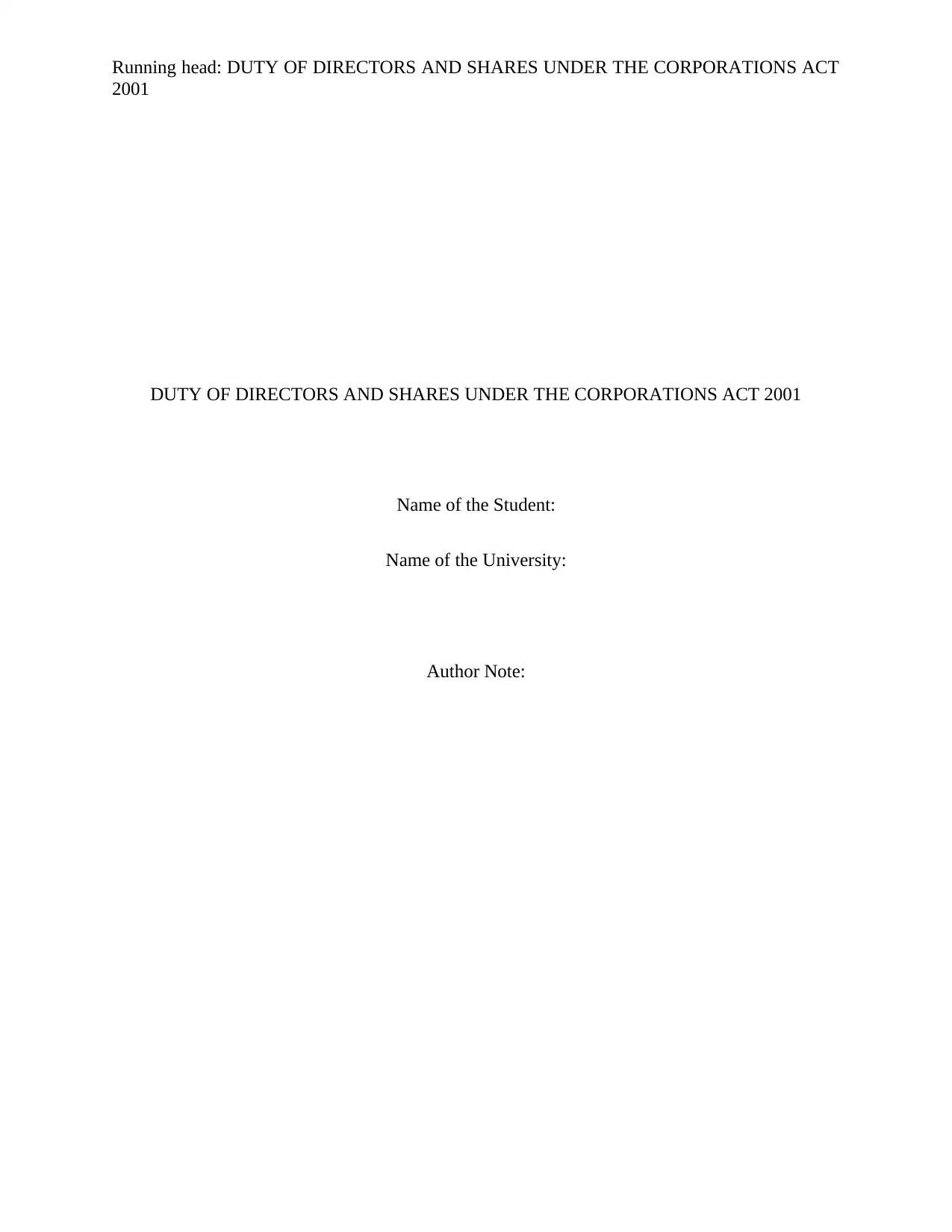
Running head: DUTY OF DIRECTORS AND SHARES UNDER THE CORPORATIONS ACT
2001
DUTY OF DIRECTORS AND SHARES UNDER THE CORPORATIONS ACT 2001
Name of the Student:
Name of the University:
Author Note:
2001
DUTY OF DIRECTORS AND SHARES UNDER THE CORPORATIONS ACT 2001
Name of the Student:
Name of the University:
Author Note:
Paraphrase This Document
Need a fresh take? Get an instant paraphrase of this document with our AI Paraphraser
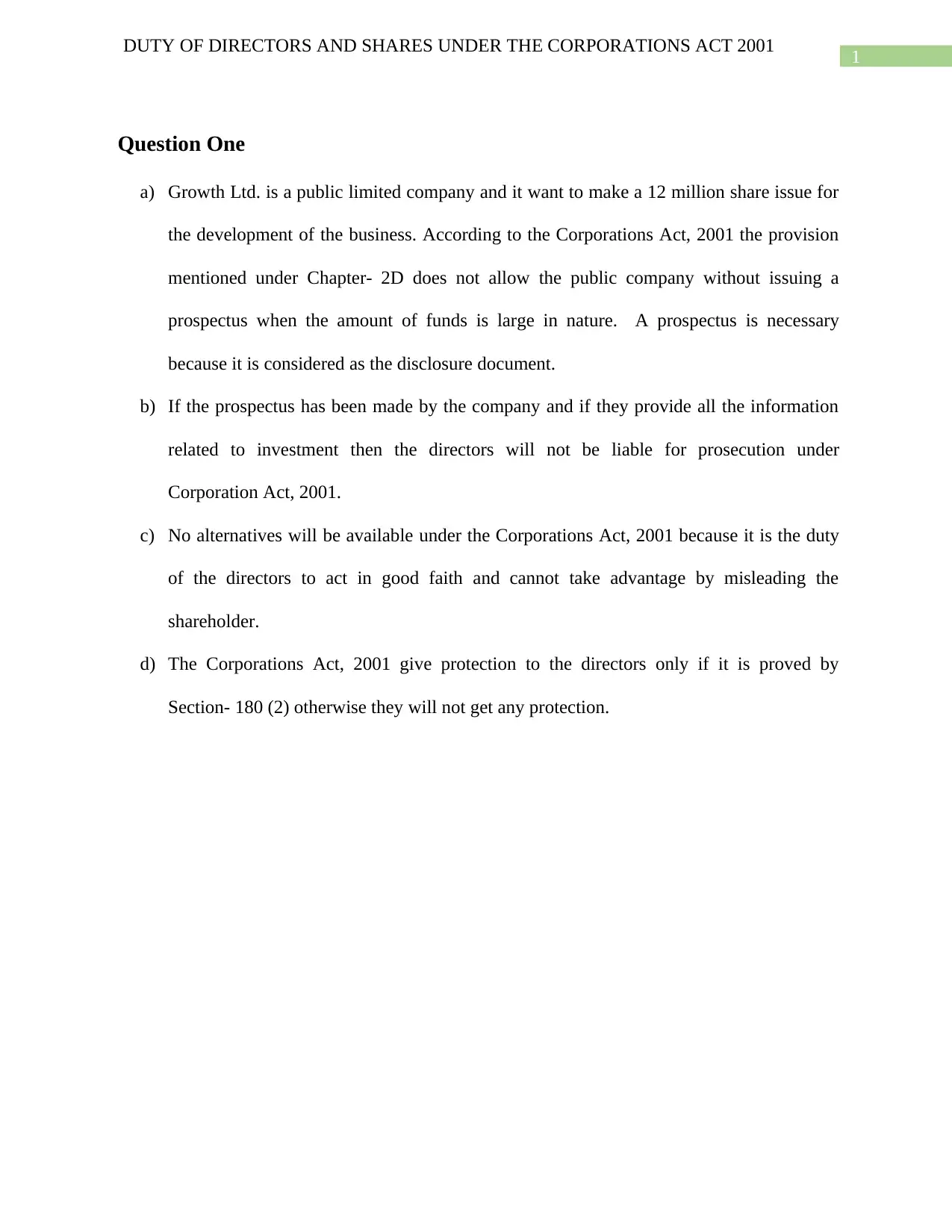
1
DUTY OF DIRECTORS AND SHARES UNDER THE CORPORATIONS ACT 2001
Question One
a) Growth Ltd. is a public limited company and it want to make a 12 million share issue for
the development of the business. According to the Corporations Act, 2001 the provision
mentioned under Chapter- 2D does not allow the public company without issuing a
prospectus when the amount of funds is large in nature. A prospectus is necessary
because it is considered as the disclosure document.
b) If the prospectus has been made by the company and if they provide all the information
related to investment then the directors will not be liable for prosecution under
Corporation Act, 2001.
c) No alternatives will be available under the Corporations Act, 2001 because it is the duty
of the directors to act in good faith and cannot take advantage by misleading the
shareholder.
d) The Corporations Act, 2001 give protection to the directors only if it is proved by
Section- 180 (2) otherwise they will not get any protection.
DUTY OF DIRECTORS AND SHARES UNDER THE CORPORATIONS ACT 2001
Question One
a) Growth Ltd. is a public limited company and it want to make a 12 million share issue for
the development of the business. According to the Corporations Act, 2001 the provision
mentioned under Chapter- 2D does not allow the public company without issuing a
prospectus when the amount of funds is large in nature. A prospectus is necessary
because it is considered as the disclosure document.
b) If the prospectus has been made by the company and if they provide all the information
related to investment then the directors will not be liable for prosecution under
Corporation Act, 2001.
c) No alternatives will be available under the Corporations Act, 2001 because it is the duty
of the directors to act in good faith and cannot take advantage by misleading the
shareholder.
d) The Corporations Act, 2001 give protection to the directors only if it is proved by
Section- 180 (2) otherwise they will not get any protection.
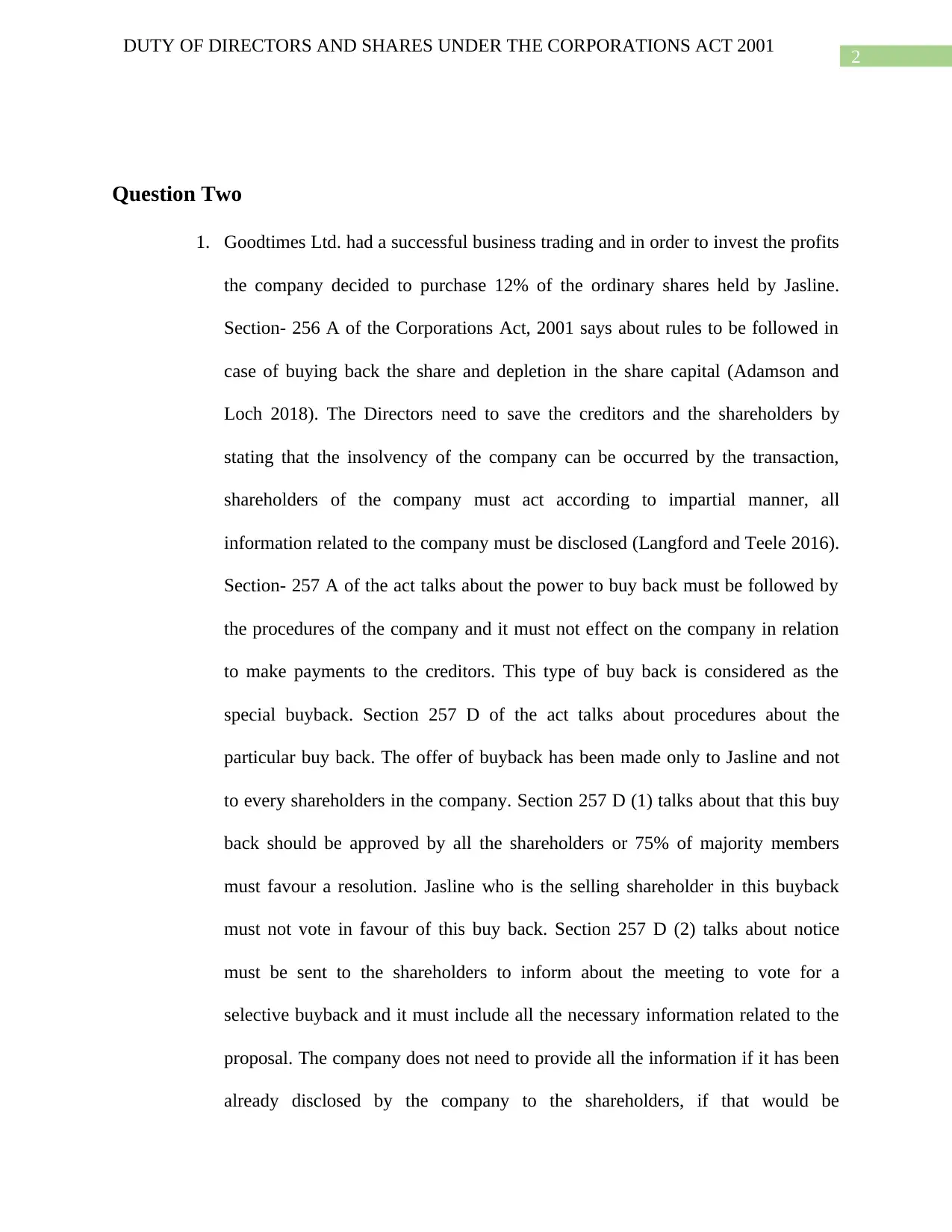
2
DUTY OF DIRECTORS AND SHARES UNDER THE CORPORATIONS ACT 2001
Question Two
1. Goodtimes Ltd. had a successful business trading and in order to invest the profits
the company decided to purchase 12% of the ordinary shares held by Jasline.
Section- 256 A of the Corporations Act, 2001 says about rules to be followed in
case of buying back the share and depletion in the share capital (Adamson and
Loch 2018). The Directors need to save the creditors and the shareholders by
stating that the insolvency of the company can be occurred by the transaction,
shareholders of the company must act according to impartial manner, all
information related to the company must be disclosed (Langford and Teele 2016).
Section- 257 A of the act talks about the power to buy back must be followed by
the procedures of the company and it must not effect on the company in relation
to make payments to the creditors. This type of buy back is considered as the
special buyback. Section 257 D of the act talks about procedures about the
particular buy back. The offer of buyback has been made only to Jasline and not
to every shareholders in the company. Section 257 D (1) talks about that this buy
back should be approved by all the shareholders or 75% of majority members
must favour a resolution. Jasline who is the selling shareholder in this buyback
must not vote in favour of this buy back. Section 257 D (2) talks about notice
must be sent to the shareholders to inform about the meeting to vote for a
selective buyback and it must include all the necessary information related to the
proposal. The company does not need to provide all the information if it has been
already disclosed by the company to the shareholders, if that would be
DUTY OF DIRECTORS AND SHARES UNDER THE CORPORATIONS ACT 2001
Question Two
1. Goodtimes Ltd. had a successful business trading and in order to invest the profits
the company decided to purchase 12% of the ordinary shares held by Jasline.
Section- 256 A of the Corporations Act, 2001 says about rules to be followed in
case of buying back the share and depletion in the share capital (Adamson and
Loch 2018). The Directors need to save the creditors and the shareholders by
stating that the insolvency of the company can be occurred by the transaction,
shareholders of the company must act according to impartial manner, all
information related to the company must be disclosed (Langford and Teele 2016).
Section- 257 A of the act talks about the power to buy back must be followed by
the procedures of the company and it must not effect on the company in relation
to make payments to the creditors. This type of buy back is considered as the
special buyback. Section 257 D of the act talks about procedures about the
particular buy back. The offer of buyback has been made only to Jasline and not
to every shareholders in the company. Section 257 D (1) talks about that this buy
back should be approved by all the shareholders or 75% of majority members
must favour a resolution. Jasline who is the selling shareholder in this buyback
must not vote in favour of this buy back. Section 257 D (2) talks about notice
must be sent to the shareholders to inform about the meeting to vote for a
selective buyback and it must include all the necessary information related to the
proposal. The company does not need to provide all the information if it has been
already disclosed by the company to the shareholders, if that would be
⊘ This is a preview!⊘
Do you want full access?
Subscribe today to unlock all pages.

Trusted by 1+ million students worldwide
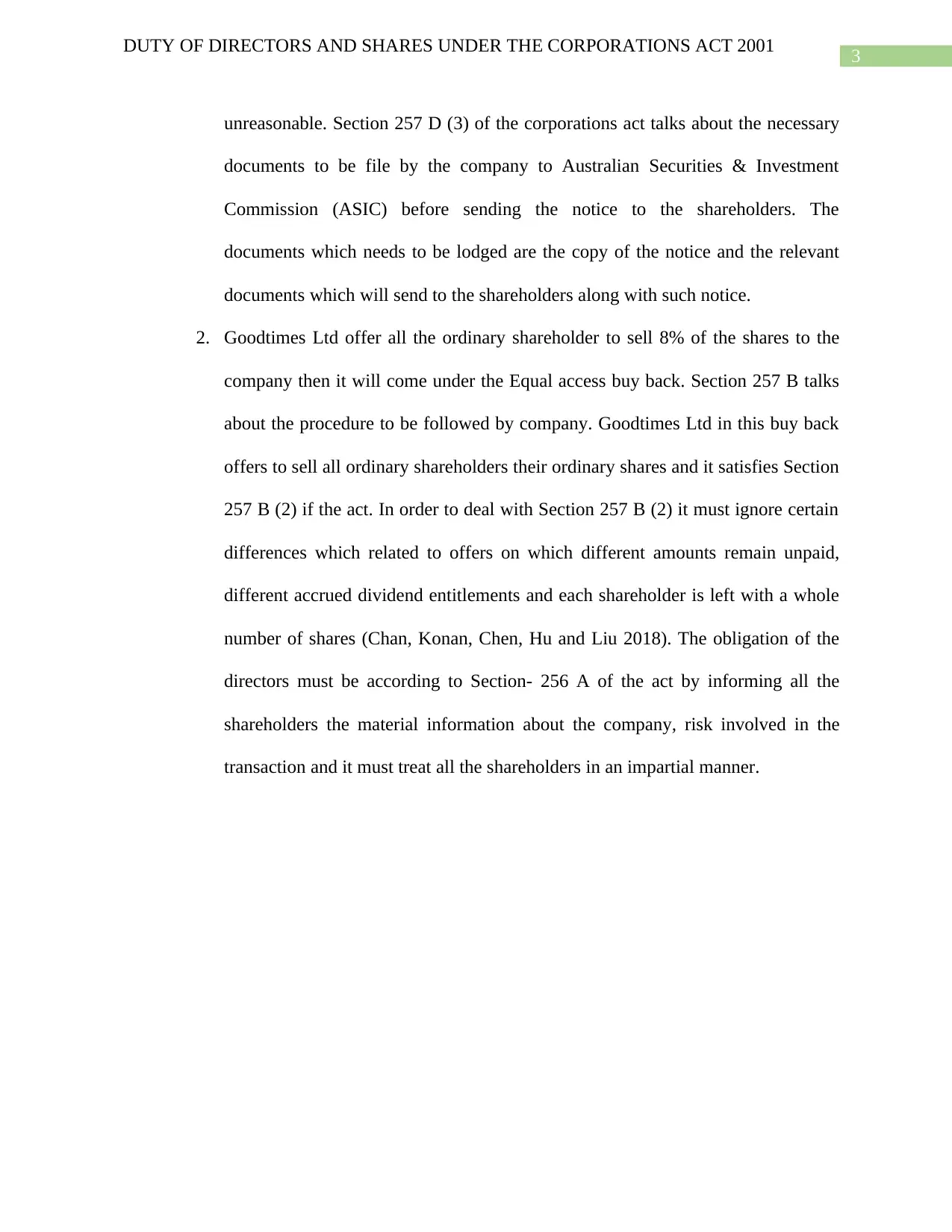
3
DUTY OF DIRECTORS AND SHARES UNDER THE CORPORATIONS ACT 2001
unreasonable. Section 257 D (3) of the corporations act talks about the necessary
documents to be file by the company to Australian Securities & Investment
Commission (ASIC) before sending the notice to the shareholders. The
documents which needs to be lodged are the copy of the notice and the relevant
documents which will send to the shareholders along with such notice.
2. Goodtimes Ltd offer all the ordinary shareholder to sell 8% of the shares to the
company then it will come under the Equal access buy back. Section 257 B talks
about the procedure to be followed by company. Goodtimes Ltd in this buy back
offers to sell all ordinary shareholders their ordinary shares and it satisfies Section
257 B (2) if the act. In order to deal with Section 257 B (2) it must ignore certain
differences which related to offers on which different amounts remain unpaid,
different accrued dividend entitlements and each shareholder is left with a whole
number of shares (Chan, Konan, Chen, Hu and Liu 2018). The obligation of the
directors must be according to Section- 256 A of the act by informing all the
shareholders the material information about the company, risk involved in the
transaction and it must treat all the shareholders in an impartial manner.
DUTY OF DIRECTORS AND SHARES UNDER THE CORPORATIONS ACT 2001
unreasonable. Section 257 D (3) of the corporations act talks about the necessary
documents to be file by the company to Australian Securities & Investment
Commission (ASIC) before sending the notice to the shareholders. The
documents which needs to be lodged are the copy of the notice and the relevant
documents which will send to the shareholders along with such notice.
2. Goodtimes Ltd offer all the ordinary shareholder to sell 8% of the shares to the
company then it will come under the Equal access buy back. Section 257 B talks
about the procedure to be followed by company. Goodtimes Ltd in this buy back
offers to sell all ordinary shareholders their ordinary shares and it satisfies Section
257 B (2) if the act. In order to deal with Section 257 B (2) it must ignore certain
differences which related to offers on which different amounts remain unpaid,
different accrued dividend entitlements and each shareholder is left with a whole
number of shares (Chan, Konan, Chen, Hu and Liu 2018). The obligation of the
directors must be according to Section- 256 A of the act by informing all the
shareholders the material information about the company, risk involved in the
transaction and it must treat all the shareholders in an impartial manner.
Paraphrase This Document
Need a fresh take? Get an instant paraphrase of this document with our AI Paraphraser
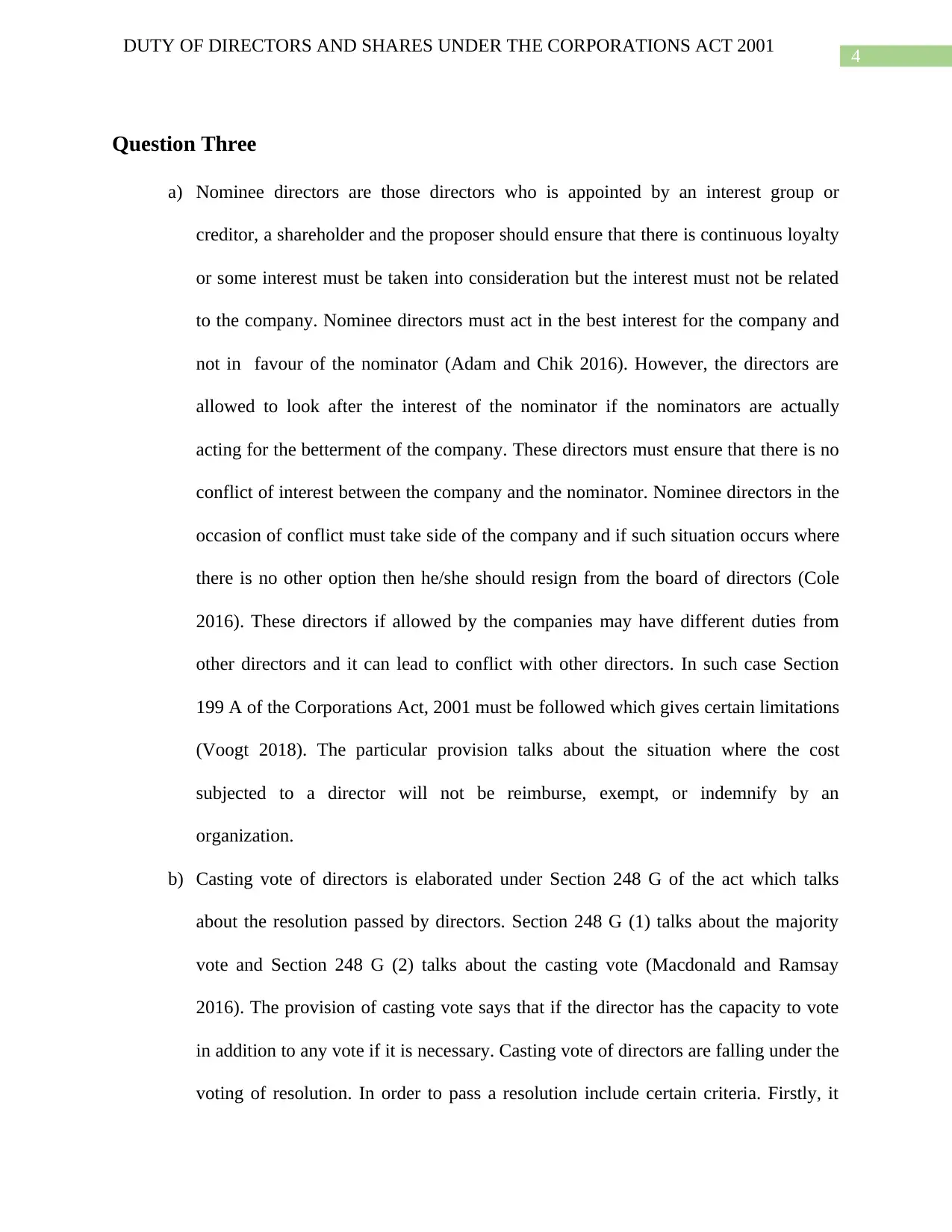
4
DUTY OF DIRECTORS AND SHARES UNDER THE CORPORATIONS ACT 2001
Question Three
a) Nominee directors are those directors who is appointed by an interest group or
creditor, a shareholder and the proposer should ensure that there is continuous loyalty
or some interest must be taken into consideration but the interest must not be related
to the company. Nominee directors must act in the best interest for the company and
not in favour of the nominator (Adam and Chik 2016). However, the directors are
allowed to look after the interest of the nominator if the nominators are actually
acting for the betterment of the company. These directors must ensure that there is no
conflict of interest between the company and the nominator. Nominee directors in the
occasion of conflict must take side of the company and if such situation occurs where
there is no other option then he/she should resign from the board of directors (Cole
2016). These directors if allowed by the companies may have different duties from
other directors and it can lead to conflict with other directors. In such case Section
199 A of the Corporations Act, 2001 must be followed which gives certain limitations
(Voogt 2018). The particular provision talks about the situation where the cost
subjected to a director will not be reimburse, exempt, or indemnify by an
organization.
b) Casting vote of directors is elaborated under Section 248 G of the act which talks
about the resolution passed by directors. Section 248 G (1) talks about the majority
vote and Section 248 G (2) talks about the casting vote (Macdonald and Ramsay
2016). The provision of casting vote says that if the director has the capacity to vote
in addition to any vote if it is necessary. Casting vote of directors are falling under the
voting of resolution. In order to pass a resolution include certain criteria. Firstly, it
DUTY OF DIRECTORS AND SHARES UNDER THE CORPORATIONS ACT 2001
Question Three
a) Nominee directors are those directors who is appointed by an interest group or
creditor, a shareholder and the proposer should ensure that there is continuous loyalty
or some interest must be taken into consideration but the interest must not be related
to the company. Nominee directors must act in the best interest for the company and
not in favour of the nominator (Adam and Chik 2016). However, the directors are
allowed to look after the interest of the nominator if the nominators are actually
acting for the betterment of the company. These directors must ensure that there is no
conflict of interest between the company and the nominator. Nominee directors in the
occasion of conflict must take side of the company and if such situation occurs where
there is no other option then he/she should resign from the board of directors (Cole
2016). These directors if allowed by the companies may have different duties from
other directors and it can lead to conflict with other directors. In such case Section
199 A of the Corporations Act, 2001 must be followed which gives certain limitations
(Voogt 2018). The particular provision talks about the situation where the cost
subjected to a director will not be reimburse, exempt, or indemnify by an
organization.
b) Casting vote of directors is elaborated under Section 248 G of the act which talks
about the resolution passed by directors. Section 248 G (1) talks about the majority
vote and Section 248 G (2) talks about the casting vote (Macdonald and Ramsay
2016). The provision of casting vote says that if the director has the capacity to vote
in addition to any vote if it is necessary. Casting vote of directors are falling under the
voting of resolution. In order to pass a resolution include certain criteria. Firstly, it
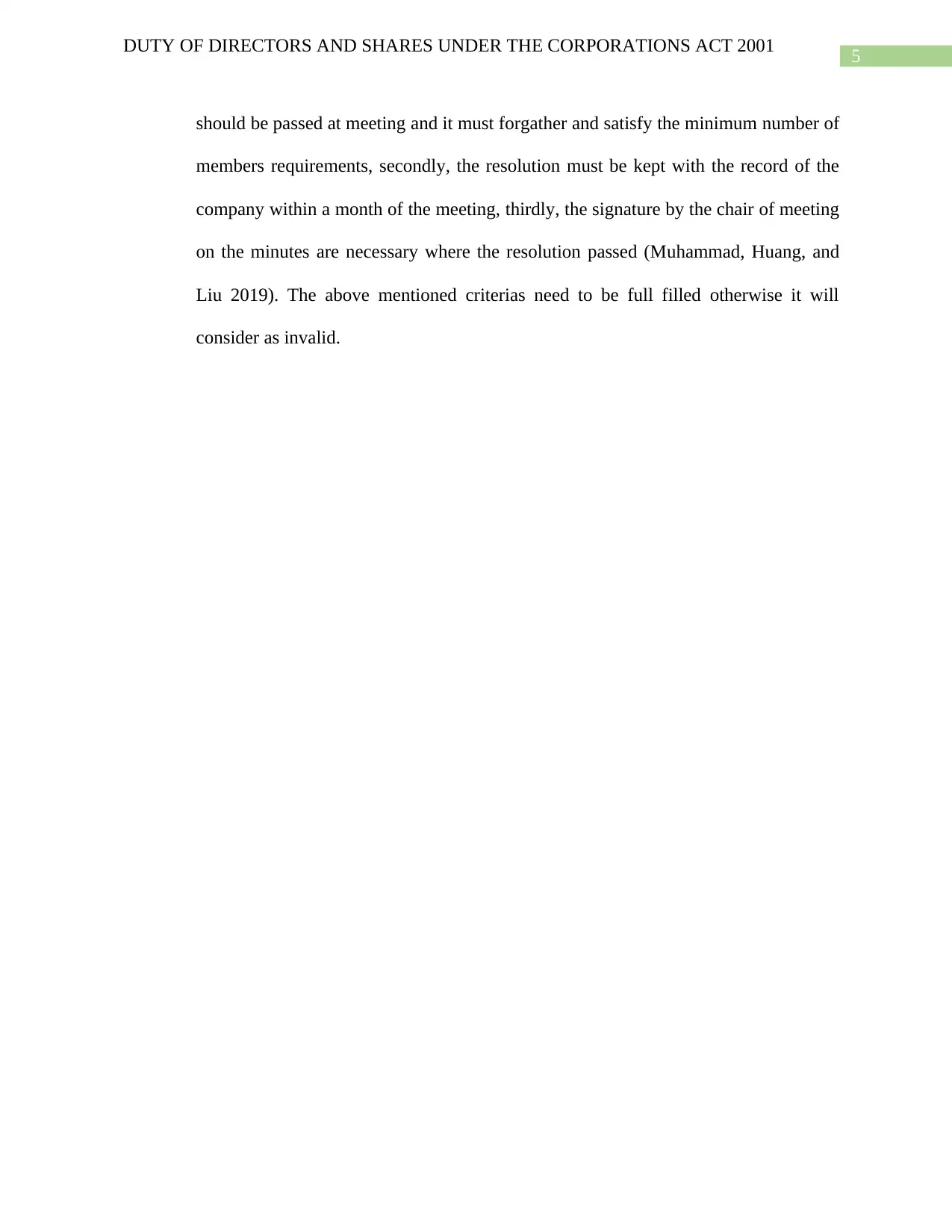
5
DUTY OF DIRECTORS AND SHARES UNDER THE CORPORATIONS ACT 2001
should be passed at meeting and it must forgather and satisfy the minimum number of
members requirements, secondly, the resolution must be kept with the record of the
company within a month of the meeting, thirdly, the signature by the chair of meeting
on the minutes are necessary where the resolution passed (Muhammad, Huang, and
Liu 2019). The above mentioned criterias need to be full filled otherwise it will
consider as invalid.
DUTY OF DIRECTORS AND SHARES UNDER THE CORPORATIONS ACT 2001
should be passed at meeting and it must forgather and satisfy the minimum number of
members requirements, secondly, the resolution must be kept with the record of the
company within a month of the meeting, thirdly, the signature by the chair of meeting
on the minutes are necessary where the resolution passed (Muhammad, Huang, and
Liu 2019). The above mentioned criterias need to be full filled otherwise it will
consider as invalid.
⊘ This is a preview!⊘
Do you want full access?
Subscribe today to unlock all pages.

Trusted by 1+ million students worldwide
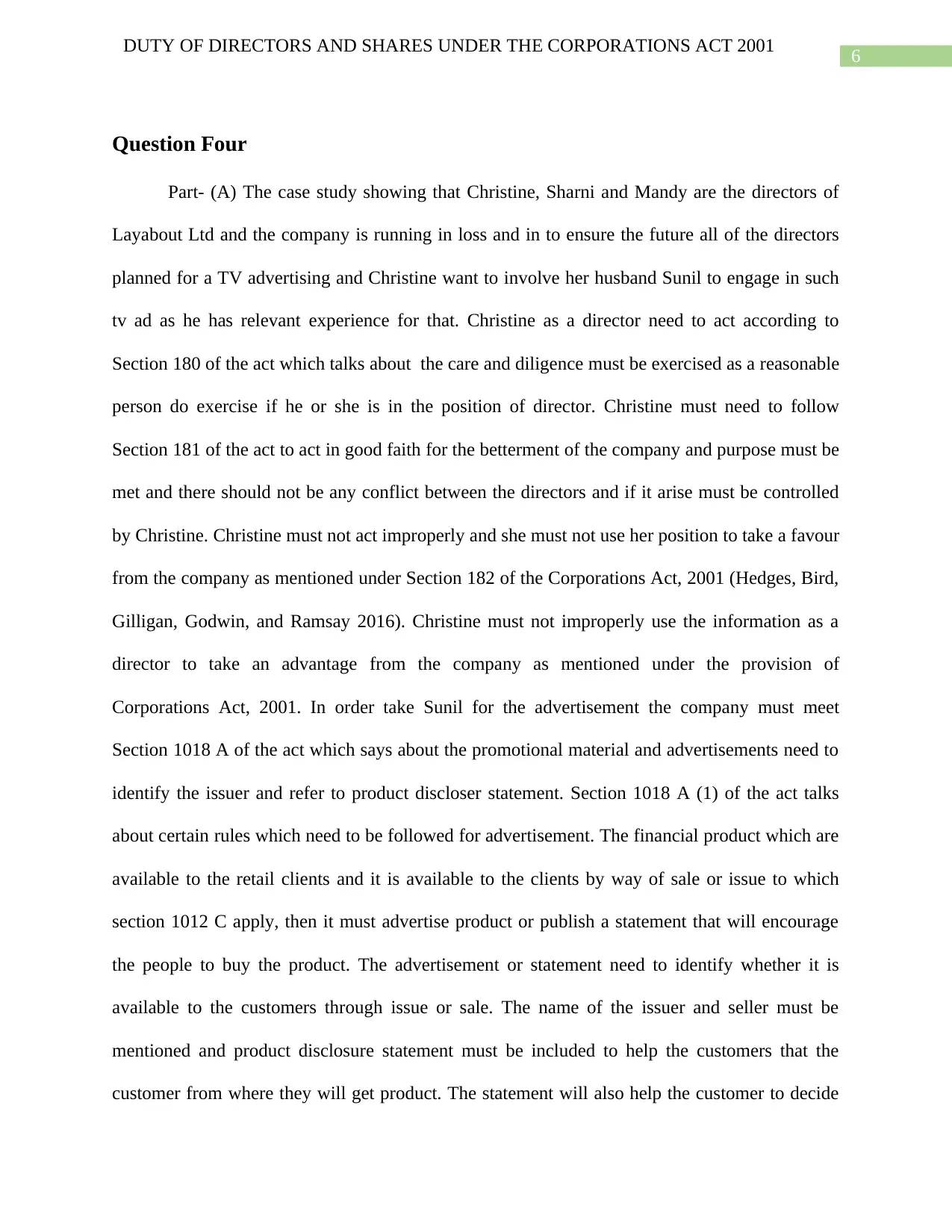
6
DUTY OF DIRECTORS AND SHARES UNDER THE CORPORATIONS ACT 2001
Question Four
Part- (A) The case study showing that Christine, Sharni and Mandy are the directors of
Layabout Ltd and the company is running in loss and in to ensure the future all of the directors
planned for a TV advertising and Christine want to involve her husband Sunil to engage in such
tv ad as he has relevant experience for that. Christine as a director need to act according to
Section 180 of the act which talks about the care and diligence must be exercised as a reasonable
person do exercise if he or she is in the position of director. Christine must need to follow
Section 181 of the act to act in good faith for the betterment of the company and purpose must be
met and there should not be any conflict between the directors and if it arise must be controlled
by Christine. Christine must not act improperly and she must not use her position to take a favour
from the company as mentioned under Section 182 of the Corporations Act, 2001 (Hedges, Bird,
Gilligan, Godwin, and Ramsay 2016). Christine must not improperly use the information as a
director to take an advantage from the company as mentioned under the provision of
Corporations Act, 2001. In order take Sunil for the advertisement the company must meet
Section 1018 A of the act which says about the promotional material and advertisements need to
identify the issuer and refer to product discloser statement. Section 1018 A (1) of the act talks
about certain rules which need to be followed for advertisement. The financial product which are
available to the retail clients and it is available to the clients by way of sale or issue to which
section 1012 C apply, then it must advertise product or publish a statement that will encourage
the people to buy the product. The advertisement or statement need to identify whether it is
available to the customers through issue or sale. The name of the issuer and seller must be
mentioned and product disclosure statement must be included to help the customers that the
customer from where they will get product. The statement will also help the customer to decide
DUTY OF DIRECTORS AND SHARES UNDER THE CORPORATIONS ACT 2001
Question Four
Part- (A) The case study showing that Christine, Sharni and Mandy are the directors of
Layabout Ltd and the company is running in loss and in to ensure the future all of the directors
planned for a TV advertising and Christine want to involve her husband Sunil to engage in such
tv ad as he has relevant experience for that. Christine as a director need to act according to
Section 180 of the act which talks about the care and diligence must be exercised as a reasonable
person do exercise if he or she is in the position of director. Christine must need to follow
Section 181 of the act to act in good faith for the betterment of the company and purpose must be
met and there should not be any conflict between the directors and if it arise must be controlled
by Christine. Christine must not act improperly and she must not use her position to take a favour
from the company as mentioned under Section 182 of the Corporations Act, 2001 (Hedges, Bird,
Gilligan, Godwin, and Ramsay 2016). Christine must not improperly use the information as a
director to take an advantage from the company as mentioned under the provision of
Corporations Act, 2001. In order take Sunil for the advertisement the company must meet
Section 1018 A of the act which says about the promotional material and advertisements need to
identify the issuer and refer to product discloser statement. Section 1018 A (1) of the act talks
about certain rules which need to be followed for advertisement. The financial product which are
available to the retail clients and it is available to the clients by way of sale or issue to which
section 1012 C apply, then it must advertise product or publish a statement that will encourage
the people to buy the product. The advertisement or statement need to identify whether it is
available to the customers through issue or sale. The name of the issuer and seller must be
mentioned and product disclosure statement must be included to help the customers that the
customer from where they will get product. The statement will also help the customer to decide
Paraphrase This Document
Need a fresh take? Get an instant paraphrase of this document with our AI Paraphraser
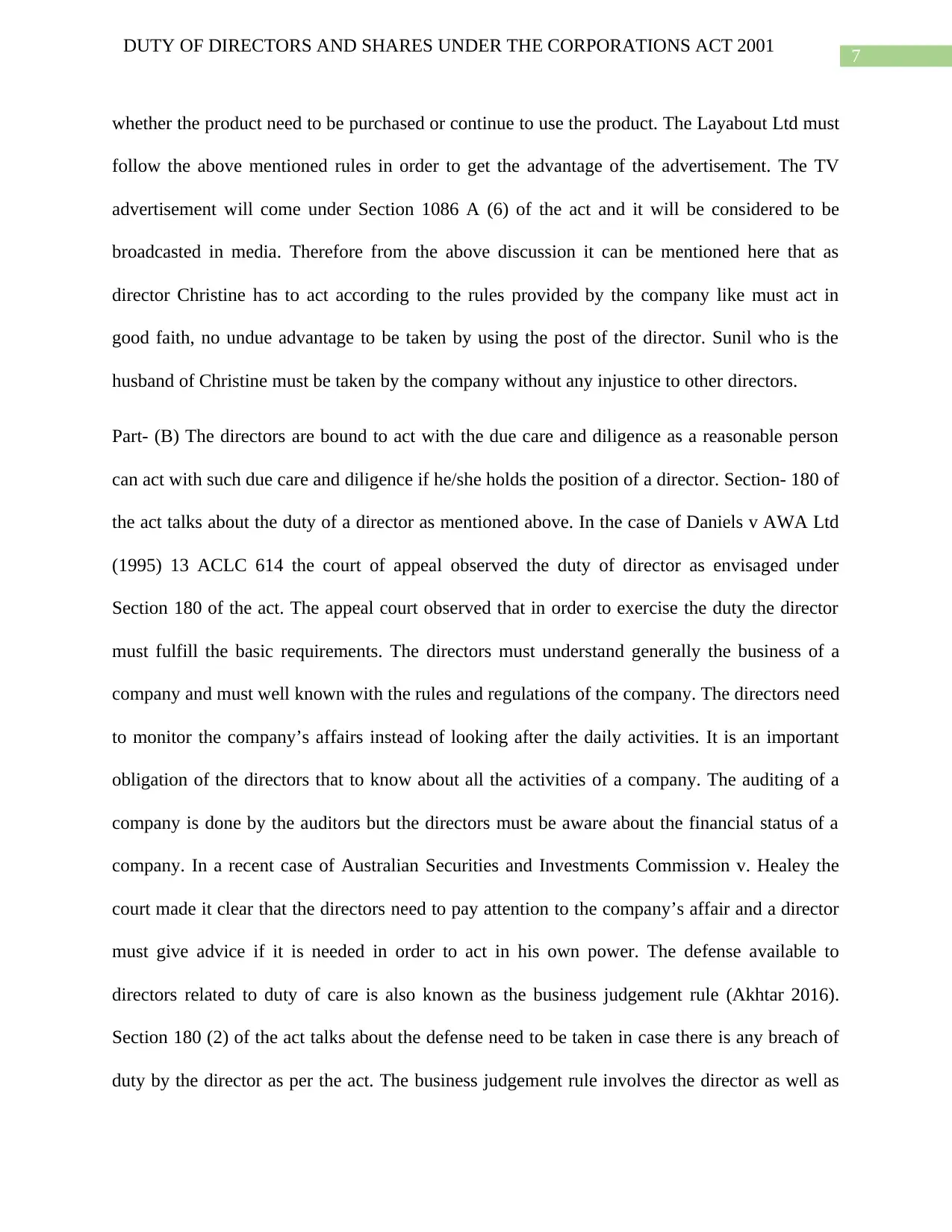
7
DUTY OF DIRECTORS AND SHARES UNDER THE CORPORATIONS ACT 2001
whether the product need to be purchased or continue to use the product. The Layabout Ltd must
follow the above mentioned rules in order to get the advantage of the advertisement. The TV
advertisement will come under Section 1086 A (6) of the act and it will be considered to be
broadcasted in media. Therefore from the above discussion it can be mentioned here that as
director Christine has to act according to the rules provided by the company like must act in
good faith, no undue advantage to be taken by using the post of the director. Sunil who is the
husband of Christine must be taken by the company without any injustice to other directors.
Part- (B) The directors are bound to act with the due care and diligence as a reasonable person
can act with such due care and diligence if he/she holds the position of a director. Section- 180 of
the act talks about the duty of a director as mentioned above. In the case of Daniels v AWA Ltd
(1995) 13 ACLC 614 the court of appeal observed the duty of director as envisaged under
Section 180 of the act. The appeal court observed that in order to exercise the duty the director
must fulfill the basic requirements. The directors must understand generally the business of a
company and must well known with the rules and regulations of the company. The directors need
to monitor the company’s affairs instead of looking after the daily activities. It is an important
obligation of the directors that to know about all the activities of a company. The auditing of a
company is done by the auditors but the directors must be aware about the financial status of a
company. In a recent case of Australian Securities and Investments Commission v. Healey the
court made it clear that the directors need to pay attention to the company’s affair and a director
must give advice if it is needed in order to act in his own power. The defense available to
directors related to duty of care is also known as the business judgement rule (Akhtar 2016).
Section 180 (2) of the act talks about the defense need to be taken in case there is any breach of
duty by the director as per the act. The business judgement rule involves the director as well as
DUTY OF DIRECTORS AND SHARES UNDER THE CORPORATIONS ACT 2001
whether the product need to be purchased or continue to use the product. The Layabout Ltd must
follow the above mentioned rules in order to get the advantage of the advertisement. The TV
advertisement will come under Section 1086 A (6) of the act and it will be considered to be
broadcasted in media. Therefore from the above discussion it can be mentioned here that as
director Christine has to act according to the rules provided by the company like must act in
good faith, no undue advantage to be taken by using the post of the director. Sunil who is the
husband of Christine must be taken by the company without any injustice to other directors.
Part- (B) The directors are bound to act with the due care and diligence as a reasonable person
can act with such due care and diligence if he/she holds the position of a director. Section- 180 of
the act talks about the duty of a director as mentioned above. In the case of Daniels v AWA Ltd
(1995) 13 ACLC 614 the court of appeal observed the duty of director as envisaged under
Section 180 of the act. The appeal court observed that in order to exercise the duty the director
must fulfill the basic requirements. The directors must understand generally the business of a
company and must well known with the rules and regulations of the company. The directors need
to monitor the company’s affairs instead of looking after the daily activities. It is an important
obligation of the directors that to know about all the activities of a company. The auditing of a
company is done by the auditors but the directors must be aware about the financial status of a
company. In a recent case of Australian Securities and Investments Commission v. Healey the
court made it clear that the directors need to pay attention to the company’s affair and a director
must give advice if it is needed in order to act in his own power. The defense available to
directors related to duty of care is also known as the business judgement rule (Akhtar 2016).
Section 180 (2) of the act talks about the defense need to be taken in case there is any breach of
duty by the director as per the act. The business judgement rule involves the director as well as
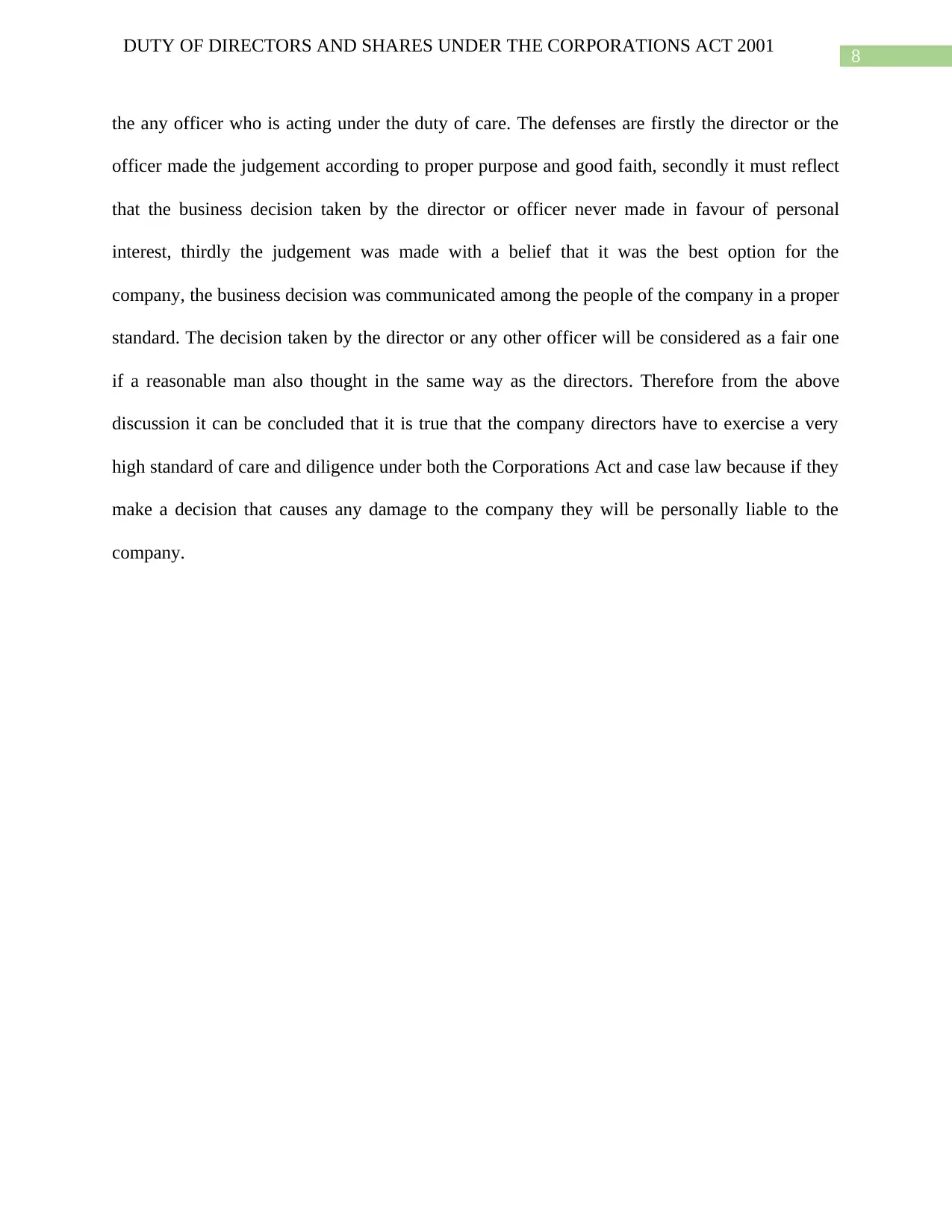
8
DUTY OF DIRECTORS AND SHARES UNDER THE CORPORATIONS ACT 2001
the any officer who is acting under the duty of care. The defenses are firstly the director or the
officer made the judgement according to proper purpose and good faith, secondly it must reflect
that the business decision taken by the director or officer never made in favour of personal
interest, thirdly the judgement was made with a belief that it was the best option for the
company, the business decision was communicated among the people of the company in a proper
standard. The decision taken by the director or any other officer will be considered as a fair one
if a reasonable man also thought in the same way as the directors. Therefore from the above
discussion it can be concluded that it is true that the company directors have to exercise a very
high standard of care and diligence under both the Corporations Act and case law because if they
make a decision that causes any damage to the company they will be personally liable to the
company.
DUTY OF DIRECTORS AND SHARES UNDER THE CORPORATIONS ACT 2001
the any officer who is acting under the duty of care. The defenses are firstly the director or the
officer made the judgement according to proper purpose and good faith, secondly it must reflect
that the business decision taken by the director or officer never made in favour of personal
interest, thirdly the judgement was made with a belief that it was the best option for the
company, the business decision was communicated among the people of the company in a proper
standard. The decision taken by the director or any other officer will be considered as a fair one
if a reasonable man also thought in the same way as the directors. Therefore from the above
discussion it can be concluded that it is true that the company directors have to exercise a very
high standard of care and diligence under both the Corporations Act and case law because if they
make a decision that causes any damage to the company they will be personally liable to the
company.
⊘ This is a preview!⊘
Do you want full access?
Subscribe today to unlock all pages.

Trusted by 1+ million students worldwide
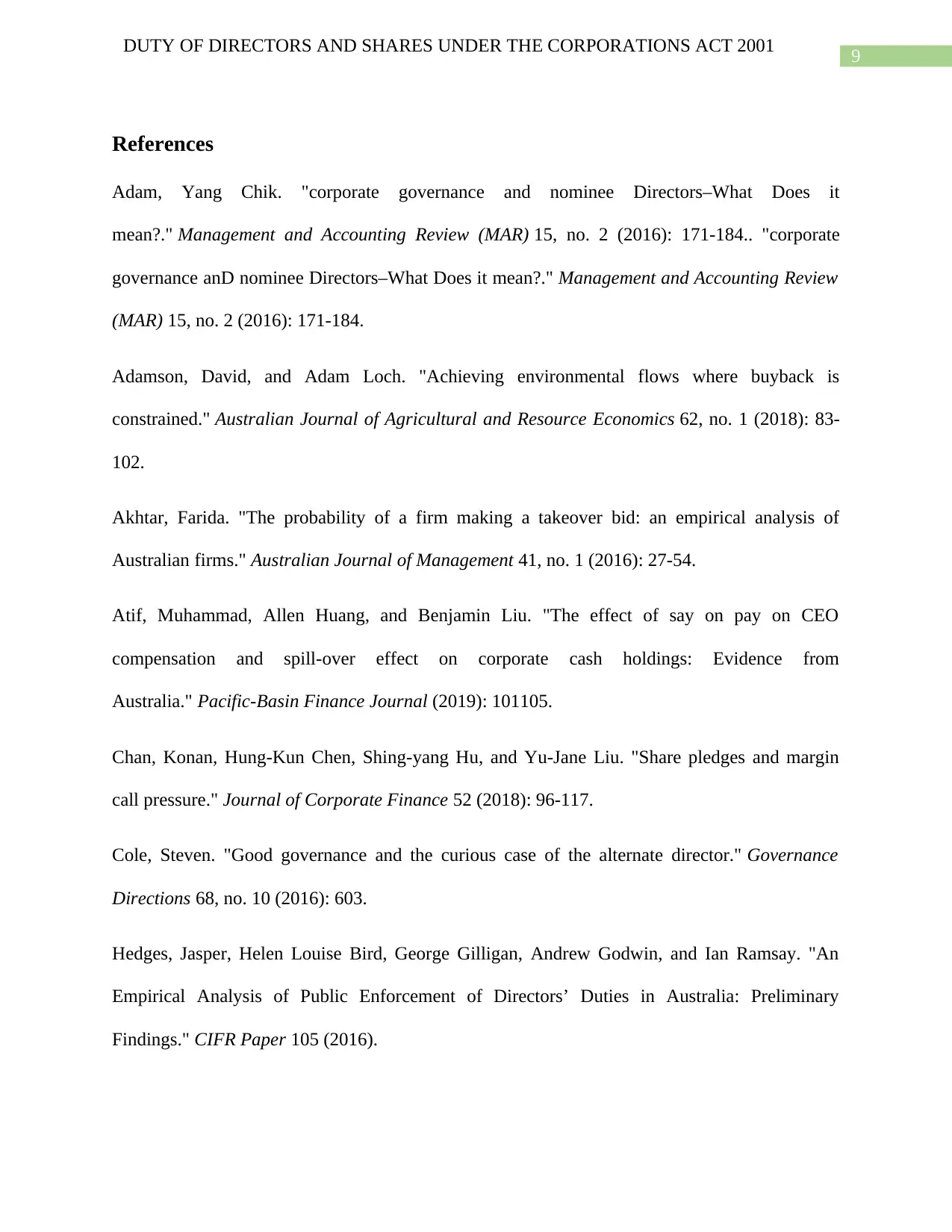
9
DUTY OF DIRECTORS AND SHARES UNDER THE CORPORATIONS ACT 2001
References
Adam, Yang Chik. "corporate governance and nominee Directors–What Does it
mean?." Management and Accounting Review (MAR) 15, no. 2 (2016): 171-184.. "corporate
governance anD nominee Directors–What Does it mean?." Management and Accounting Review
(MAR) 15, no. 2 (2016): 171-184.
Adamson, David, and Adam Loch. "Achieving environmental flows where buyback is
constrained." Australian Journal of Agricultural and Resource Economics 62, no. 1 (2018): 83-
102.
Akhtar, Farida. "The probability of a firm making a takeover bid: an empirical analysis of
Australian firms." Australian Journal of Management 41, no. 1 (2016): 27-54.
Atif, Muhammad, Allen Huang, and Benjamin Liu. "The effect of say on pay on CEO
compensation and spill-over effect on corporate cash holdings: Evidence from
Australia." Pacific-Basin Finance Journal (2019): 101105.
Chan, Konan, Hung-Kun Chen, Shing-yang Hu, and Yu-Jane Liu. "Share pledges and margin
call pressure." Journal of Corporate Finance 52 (2018): 96-117.
Cole, Steven. "Good governance and the curious case of the alternate director." Governance
Directions 68, no. 10 (2016): 603.
Hedges, Jasper, Helen Louise Bird, George Gilligan, Andrew Godwin, and Ian Ramsay. "An
Empirical Analysis of Public Enforcement of Directors’ Duties in Australia: Preliminary
Findings." CIFR Paper 105 (2016).
DUTY OF DIRECTORS AND SHARES UNDER THE CORPORATIONS ACT 2001
References
Adam, Yang Chik. "corporate governance and nominee Directors–What Does it
mean?." Management and Accounting Review (MAR) 15, no. 2 (2016): 171-184.. "corporate
governance anD nominee Directors–What Does it mean?." Management and Accounting Review
(MAR) 15, no. 2 (2016): 171-184.
Adamson, David, and Adam Loch. "Achieving environmental flows where buyback is
constrained." Australian Journal of Agricultural and Resource Economics 62, no. 1 (2018): 83-
102.
Akhtar, Farida. "The probability of a firm making a takeover bid: an empirical analysis of
Australian firms." Australian Journal of Management 41, no. 1 (2016): 27-54.
Atif, Muhammad, Allen Huang, and Benjamin Liu. "The effect of say on pay on CEO
compensation and spill-over effect on corporate cash holdings: Evidence from
Australia." Pacific-Basin Finance Journal (2019): 101105.
Chan, Konan, Hung-Kun Chen, Shing-yang Hu, and Yu-Jane Liu. "Share pledges and margin
call pressure." Journal of Corporate Finance 52 (2018): 96-117.
Cole, Steven. "Good governance and the curious case of the alternate director." Governance
Directions 68, no. 10 (2016): 603.
Hedges, Jasper, Helen Louise Bird, George Gilligan, Andrew Godwin, and Ian Ramsay. "An
Empirical Analysis of Public Enforcement of Directors’ Duties in Australia: Preliminary
Findings." CIFR Paper 105 (2016).
Paraphrase This Document
Need a fresh take? Get an instant paraphrase of this document with our AI Paraphraser
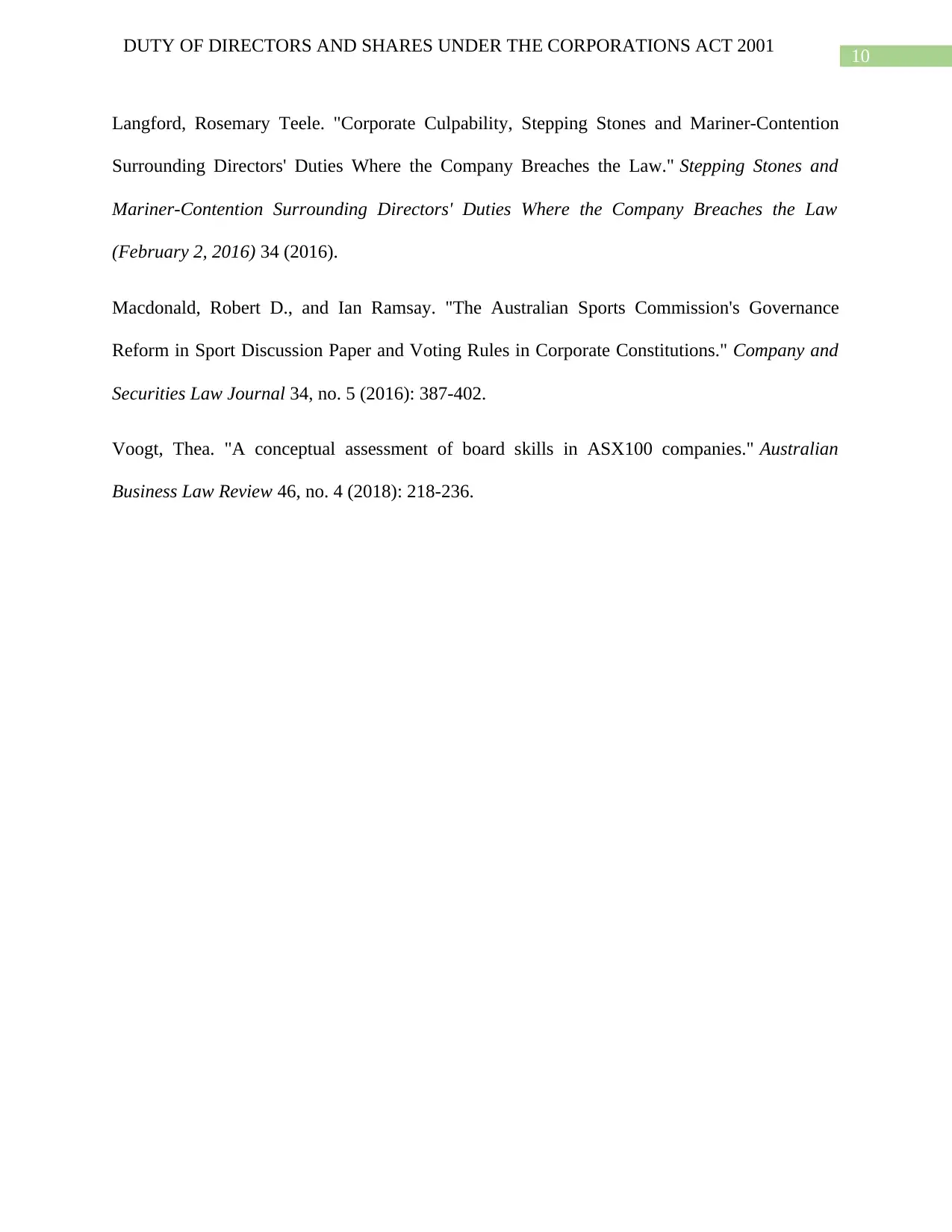
10
DUTY OF DIRECTORS AND SHARES UNDER THE CORPORATIONS ACT 2001
Langford, Rosemary Teele. "Corporate Culpability, Stepping Stones and Mariner-Contention
Surrounding Directors' Duties Where the Company Breaches the Law." Stepping Stones and
Mariner-Contention Surrounding Directors' Duties Where the Company Breaches the Law
(February 2, 2016) 34 (2016).
Macdonald, Robert D., and Ian Ramsay. "The Australian Sports Commission's Governance
Reform in Sport Discussion Paper and Voting Rules in Corporate Constitutions." Company and
Securities Law Journal 34, no. 5 (2016): 387-402.
Voogt, Thea. "A conceptual assessment of board skills in ASX100 companies." Australian
Business Law Review 46, no. 4 (2018): 218-236.
DUTY OF DIRECTORS AND SHARES UNDER THE CORPORATIONS ACT 2001
Langford, Rosemary Teele. "Corporate Culpability, Stepping Stones and Mariner-Contention
Surrounding Directors' Duties Where the Company Breaches the Law." Stepping Stones and
Mariner-Contention Surrounding Directors' Duties Where the Company Breaches the Law
(February 2, 2016) 34 (2016).
Macdonald, Robert D., and Ian Ramsay. "The Australian Sports Commission's Governance
Reform in Sport Discussion Paper and Voting Rules in Corporate Constitutions." Company and
Securities Law Journal 34, no. 5 (2016): 387-402.
Voogt, Thea. "A conceptual assessment of board skills in ASX100 companies." Australian
Business Law Review 46, no. 4 (2018): 218-236.
1 out of 11
Related Documents
Your All-in-One AI-Powered Toolkit for Academic Success.
+13062052269
info@desklib.com
Available 24*7 on WhatsApp / Email
![[object Object]](/_next/static/media/star-bottom.7253800d.svg)
Unlock your academic potential
Copyright © 2020–2026 A2Z Services. All Rights Reserved. Developed and managed by ZUCOL.





